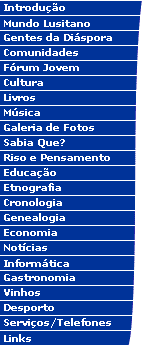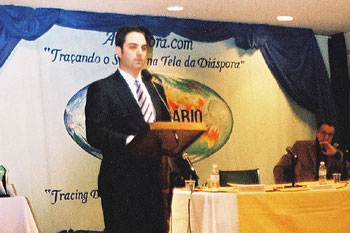




|
PRESENTATION
BY SENATOR DAN DA PONTE
January 18, 2004
Thank you very much. I am going to try to do
this program today as bilingual as possible. First I would like to thank Jose
Ferreira and Adiaspora.com for the invitation to be here, and also congratulate
you and all of those who have been involved in making Adiaspora.com a reality.
Any of us that utilize email, the Internet or the web really can realize what a
powerful tool it can be. This is certainly a method and a way to reach, not
only a city, a state or a province but the entire world. As you’ve heard in my biography that Ana was describing, I
guess my situation is somewhat unique. During the past day and a half here I
have had the opportunity to talk with many of you and talk with many of the
people, and make some references, and maybe some comparisons at how different
the political climates and the political and governmental structures are
between the United States and Canada. I was elected back in November 1998 from a
working class district of many Portuguese immigrants. My parents were obviously
both immigrants from the Azores as was mentioned and like many of you came here
or came to the US looking for better opportunity and to make a better life for
themselves but also to pave the way for a bright future for their children. I’d like to just begin by giving you an
overview of what strides we have made in the Portuguese community of Rhode
Island, at least in Rhode Island (and yesterday you heard from my good friend
Tony Cabral about the political climate in Massachusetts). Today in Rhode Island we are proud to have a
general officer of the state, who was actually my predecessor in the State
Senate, Paul Tavares, the son of Azorean immigrants from São Miguel, who serves
as the State Treasurer, and who was elected back in 1998. When I was elected to
the State Senate he was elected to State Treasurer, and elected by the entire
state of Rhode Island. We are a small state, small in size, small in numbers
but our numbers are still larger than Alaska, which is the biggest state by
land. Paul was elected, not only because he was
certainly qualified for the job, but had the support and respect of the
Portuguese community. Like many of us who have been fortunate enough to serve
and have been elected, whether it be at the local level, whether it be at the
statewide level, or even appointed positions, the one thing that I found is
that many, not all, are not just Portuguese by their last name but know the
issues, know the culture and know the needs of the Portuguese community. I look at my district, for example, of East
Providence where I live and grew up. It is a city of about 50 000 people. I
would say that about a good 20 000 of them are of Portuguese descent, many
first generation immigrants. When my predecessor decided to run for State
Treasurer there was really a void and there was a lot of concern from the
Portuguese community that there wouldn’t be someone who would be able to return
a phone call and speak to them in their native language. What was most
interesting to me as I began this endeavour and looked back at the history of
the seat that I currently hold in the city of East Providence (and now I have
also picked up part of the Portuguese section of Providence, our capital city)
was that for the 47th consecutive year, the person who has held that
seat has been of Portuguese-American heritage, has been a member of St. Francis
Xavier Parish and has been a member of the Holy Ghost Beneficial Brotherhood. I
look around the state and I don’t think that has ever, at least in Rode Island,
been the case. What that tells me and should tell all of us, especially the
youth that are here, (I look around and
can see several young faces) is that there is power in numbers. In our
community, that is obviously so proud of what we have accomplished, this has really
been demonstrated in my case. In the US and Canada you probably have the same. We always talk about the American Dream in the
US. I look at myself and at my circumstances and I am living an American Dream,
a great deal of which had to do with the support of the Portuguese community
and also a knowledge, an understanding and appreciation for our culture, for
our heritage and our language. In Rhode Island we have, as I have mentioned, a
Treasurer who is of Portuguese descent, who is fluent in Portuguese and who
listens to fado in his state vehicle as he drives around the state. We
have nine members of the House of Representatives who are of Portuguese
descent, a few of which who actually speak Portuguese and some that are
unfortunately Portuguese in name only. In the Senate, where I have served in
the last five years, there are three of us. These past several weeks we had
some political turmoil. We had the election of the Senate majority leader, who
is the second most powerful person in the Senate. She is actually a woman of
Portuguese-American descent, Maria Teresa Paiva and her last name is Weed, (she
married an American man) who is now the
second most powerful person in the State Senate and who is very proud of her
Portuguese heritage and who also has a very active and supportive Portuguese
community in the beautiful city of Newport. Some of you may have had the
opportunity to visit and if you haven’t, the door is always open. We have a
wonderful, very vibrant Portuguese community in the State of Rhode Island that
is prepared to welcome you. As I said, we are a small state of about a
million people. Fortunately we have about 10% of the population that is of
Portuguese-American ancestry and one that is very active, not only at the state
level but also at the local level. Speaking about politics and government, we
have many city and town councils who have members who are of
Portuguese-American heritage, some actually immigrants. We have chiefs of
police who are first and second generation Portuguese-Americans. But there is
something that I think that we all have in common, which is that many of us
have been involved in organizations like this for many, many years and know
what it is like to be Portuguese. I would ask but I won’t because some may be
embarrassed, I would venture to guess that some who are in this room are
immigrants. This is an example I use often because I think it tends to humble
me, and how I view things. I think of my father who came form São Miguel from
the very poor village of Rabo de Peixe, that some of you may know, who never
had a pair of shoes until he came and immigrated to the United States. And I
often think, especially with organizations and groups like you, that I can’t
imagine what it must be like to just one day pick up everything you have, which
for many was probably very little, and move to a world, or move across the
world, to a place where you knew no-one, didn’t know how to speak the language
and had to completely start from new. That is the example I use very often especially
to the young people that I speak to. When we sometimes look at a goal or
something that we want to accomplish and it seems impossible and we see people
that are successful, who have worked hard to be successful and admire what they
have done and how they have done it, what strikes me is that we don’t have to
look very far but look at our own parents, grandparents, aunts and uncles and
see what they’ve accomplished, the sacrifices they’ve had made for us and
specifically for my generation and the generations to come to have greater
opportunities. For that you all deserve a round of applause. Really! This message is mostly for the youth but for
those of you here who may have children at home I can’t stress how important it
is, if for nothing else, to just get a greater appreciation for different
cultures, for our own culture, for our own language, to just get involved in
some way, some shape of form, to get involved whether it be through civic
organizations, whether it be thorough religious or political organizations or
campaigns. Tony Cabral, I think, made a terrific point and
that is that it’s all about connections and it’s all about relationships. If we
were to depend on just the Portuguese community to get elected, chances are
that it wouldn’t happen. But when you represent different communities then they
see that you have an appreciation and a respect for your own culture. They know
that you have a respect, although you may not be of their ethnicity, culture or
background, for what they have gone through and the challenges that they face.
And that is, I think, all a result of making those very important connections
and getting involved with civic or beneficial organizations, whatever they
happen to be. So to the youth here and to all of you (I guess you are here
because you are already involved in some way shape of form), the next time you
go to an event or a meeting of whatever organization you are involved with,
bring a friend, bring five friends! With respect to politics and government, I always
say it doesn’t matter what you do in life, you can be a doctor,
you can be an accountant, you can be a construction worker,
you can be a dentist, it doesn’t really matter, but at some
point in your life, your profession, your desires or your hobbies,
etc, will cross paths with the political and governmental process.
It may not be today. It may not be five years from now but it
may be twenty or twenty-five years from now. Give yourselves
the opportunity and take that leap of faith just like our parents
and grandparents did when they picked up everything they had
and moved to a new world. Take that leap of faith and get involved
with the type of organizations that will provide you with those
connections and relationships that will last you a lifetime! |

